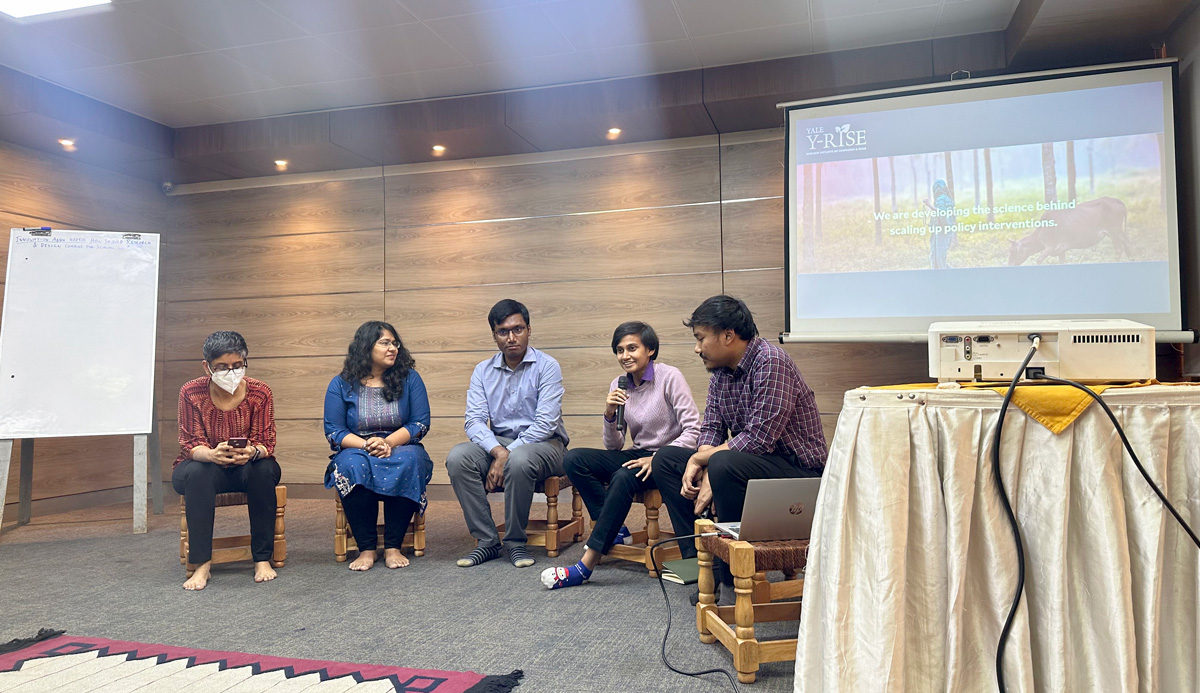“Small is beautiful but big is necessary” is at the core of BRAC’s values as an organisation. Every project that BRAC has piloted started small with the aim of scaling it up to create a real impact across communities. For the first Innovation Adda of 2023, we wanted to facilitate a discussion on the challenges of scaling with the Yale Research Initiative on Innovation and Scale (Y-RISE), an organisation that shares BRAC’s vision of evidence-based decision making through evaluating the effects of policy interventions when delivered at scale. Moderated by Durdana Mahfuz, Business Designer, and Mark Pranta Hagidok, Research & Insights Specialist, from the Social Innovation Lab, the Adda aimed to exchange some insights from implementers at BRAC and the researchers at Y-Rise to understand how to crack the scaling code in light of their learnings from the field.
Janani Rajashekar, Program and Communications Manager at Y-RISE, opened the discussion by reviewing their research project, “No Lean Season” aimed at curbing pre-harvest season famines in rural Bangladesh. She relayed back how these famines are a recurring feature of rural life because of how between planting and harvest seasons, the demand for agricultural labour falls while the prices of food simultaneously increase. Families faced with acute food shortages often cope by sending a family member to the city, where the employment prospects and wages rates remain high throughout the lean season. However, as mentioned by Islamul Haque, Economics PhD Candidate at University of Southern California, for families who were barely subsisting, migrating to the city bore unacceptable “risks and costs” associated with migration were simply not viable for them.
To tackle this problem, the team wanted to understand if the provision of a small grant would enable these families to migrate for work during lean season. They began disbursing $20 subsidies to people to see if this would persuade them to travel to the city to seek out seasonal work. The results were quite promising- it doubled the rate of migration and the net uptake of calories among people increased between 550-700 a day. This created patterns of migration that endured throughout the years as the migrants established networks with employers and went back to the city during the next lean season. Neela A. Saldanha, Executive Director at Y-RISE, told us the results were outstanding given the real risk of these migrants not finding a job once they got to the city, enough of these families willingly took on that risk because the threat of starvation was that much greater.
But should we be scaling up when so many questions remain unanswered? Could the migrants end up in a worse situation than the ones they left behind at home? Could they end up saturating the market when they migrate en masse and drag down wages? Could there possibly be a skills mis-match between what the migrants were capable of doing and the kinds of jobs being offered in the city? But should all these questions have prevented the programme from being scaled up?
“As we scale, the questions that we can answer and want to answer will change. We are not saying don’t scale until you have all these answers, we are saying as you scale it, you want to learn the answers to these questions.” – Janani Rajashekar, Program and Communications Manager at Y-RISE.
What was more important in this particular instance was for the programme to be helping families left vulnerable by these pre-harvest season famines than to immediately begin calibrating all the ways in which this programme might not succeed when scaled up. The programme intended to target families living close to subsistence who would benefit from having the opportunity of moving to the city to find seasonal work and in-sofar as the programme achieved that target, the programme will have served its purpose.
But when the NGO involved with the programme tried to scale up this programme, they hit a snag. When disbursing the subsidies to people, the researchers found that agents in charge of disbursing the subsidies became resource constrained timewise. As they were being asked to hit their target goals, agents began seeking out and disbursing the subsidies to people who were the easiest to reach and people who were always going to migrate to the city anyways, which undermined the goals of the programme. So while the programme was quite successful on a small scale, scaling up created a brand new set of unforeseen challenges that necessitated rethinking the team’s approach to the programme’s design and recalibrating its possible spillover effects.
“NGOs involved might be doing a good job, but they may not be going after the right goal that is required for the right impact.”- Neela A. Saldanha, Executive Director at Y-RISE
This is what led to the creation of Y-RISE – to understand the true complexities of scaling. They identified that the best way to design interventions that truly uplift people would be by collaborating with partners who not just possess a great degree of experience implementing these interventions on a large scale, but also had a great deal of knowledge about the on-the-ground realities where these interventions were being implemented.
“We learn from you about what a programme implementation is, and you learn from the partnership what the propensity of scaling up (is)”- Neela A. Saldanha, Executive Director at Y-RISE.
This Innovation Adda was a good reminder of the importance of building global partnerships for knowledge sharing and learning from past missed successes to inform how we approach designing and scaling up our interventions in the future. It is important to remember that what has worked on a small scale might not work when we scale up, but continuously adapting to the shifting landscape in which our interventions have to operate is precisely what helps make them so resilient.
